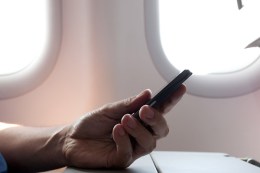
When Alec Baldwin’s recent American Airlines flight was stalled on the tarmac, he refused to turn off his cell phone because he was playing Words with Friends. Though the incident proved to be a nuisance for the airline and its employees, the actor’s one-man stand against an established air-travel policy is not unfounded.
Since the 1980s, airlines have prohibited passengers from using any electronic devices while planes are in flight (and as they depart and land) for fear of interference with aircraft systems. The problem? The evidence to support such interference seems to be, at best, anecdotal. NewsFeed contacted pilot and ABC News aviation analyst John Nance, who says that because of infighting between the Federal Aviation Administration (FAA) and the Federal Communications Commission (FCC), there has never been a study that has conclusively found that any gadgets interfere with avionics. Instead, flight crews have merely been taught to instruct passengers based on an err-on-the-side-of-caution policy. “[Airlines] wrote the scripts that phones can interfere with the systems of the aircraft,” says Nance. “But there is zero evidence.”
(LIST: 20 Reasons to Hate the Airlines)
Instead, much of the speculation over the past 30 years is based on accounts given by pilots or other flight crew members about what they perceived as electronic dysfunction because of unauthorized use of gadgets on planes. In June, the International Air Transport Association (IATA) published the results of an anonymous six-year survey, which included respondents from 125 airlines. In all, the report found that there were 75 incidents in which airline pilots or crew believed there was electronic interference that affected flight controls. Although the IATA stressed that it was not making a direct correlation between plane malfunctions and electronic interference from personal electronic devices, the stories suggested a possible link. Boeing analyst Dave Carson, who supported the evidence in the report, took an ABC News investigator into an electronic test chamber in Seattle, where engineers demonstrated that signals from several electronic devices were well over what Boeing considers the acceptable limit for aircraft equipment.
But what’s confounding about that experiment now is that one of the devices Carson found to be most problematic — the iPad — is the very same gadget that the FAA announced on Dec. 14 it would allow American Airlines pilots to use in their cockpits. The hypocrisy wasn’t lost on travel bloggers. The FAA, according to the New York Times, said that allowing pilots to use iPads in the cockpit “involves a significantly different scenario for potential interference than unlimited passenger use.” Nance says that if there were truly an issue with electronic interference, then the airlines should not even allow people to take devices onboard with their batteries in. These kinds of questions can make it difficult for some, like Baldwin, to comply with what increasingly seems like an arbitrary rule. “Alec Baldwin should’ve complied,” says Nance. “But it becomes very irritating to those of us who know the truth.”
MORE: Holiday Travel 101: How to Avoid 5 Airline Horror Stories






